Iran Says It Broke Up Israeli Sabotage Group, Made Arrests
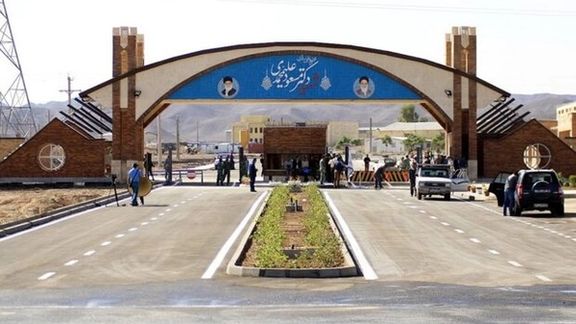
Iran said on Monday its security forces had thwarted a planned sabotage at the country's Fordow nuclear site by a network it accused Israel of recruiting, making arrests.

Iran said on Monday its security forces had thwarted a planned sabotage at the country's Fordow nuclear site by a network it accused Israel of recruiting, making arrests.
Iranian state television said an Israeli officer first contacted a neighbor of an employee of the uranium enrichment plant and managed to recruit them both after paying them in cash and digital currency.
Revolutionary Guards security agents were monitoring the network and were able to break it up before the sabotage could be carried out, arresting an unspecified number of people, the television said.
The state news agency IRNA said a new agency called Revolutionary Guards Nuclear Command, which it said had been set up to oversee defense and security matters at nuclear installations, was involved in the operation to stop the planned sabotage.
Iran has accused Israel of carrying out several attacks on facilities linked to its nuclear program and of killing its nuclear scientists over the past years. Israel has neither denied nor confirmed the allegations.
Iranian security agencies in the past have claimed arrests of spies and “terrorists” but have not produced any evidence and or follow up information about trials and possible sentences.
Israel confirmed reports late Monday that several websites, including its government site, were disrupted by a "broad cyberattack". The Iranian IRGC cyber army has attacked Israeli websites in the past.
With reporting by Reuters
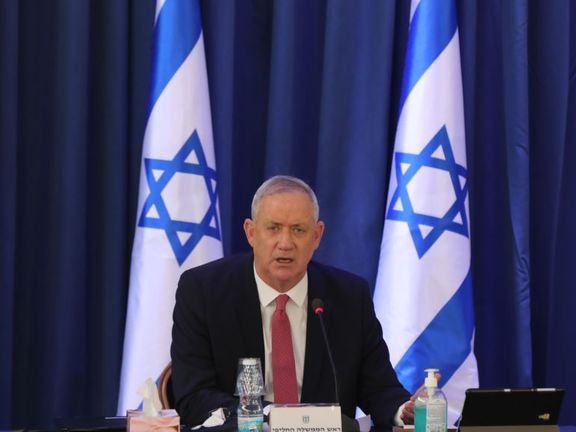
Israeli defense minister Benny Gantz says Iran is an enemy that “wants to annihilate us” and is trying to find the means.
Gantz made the remarks on Monday during a symposium commemorating Menachem Begin, founder of the Likud party. Begin was Israeli prime minister in 1982 at the time of the invasion of Lebanon and of Operation Opera, aka Operation Babylon, an airstrike on Iraq’s Osirak nuclear reactor.
“To deal with the Iranian aggression now requires political responsibility, prudent conduct and operational determination − and not hollering from the podium,” Gantz said.
He went on to say that Israel should do whatever it can, with or without the cooperation of its allies, to keep its security intact, adding, “We don’t have the privilege to lose even a single battle”.
Gantz claimed there were parallels between Begin and Yitzhak Rabin, the Labor prime minister killed in 1995 by a right-wing extremist two years after he signed the 1993 ‘Oslo Accords’ with the Palestinian Liberation Organization. “They saw themselves as fighting for Israel’s security and fighting for peace,” Gantz said.
Heading a military delegation, deputy chief of the Israeli Defense Forces Herzi Halevi landed in the US Monday for meetings with security officials at the Pentagon over how Washington might react to Iran firing missiles Sunday at Iraq’s Erbil in response to an Israeli airstrike on Damascus that killed two Iranian soldiers.
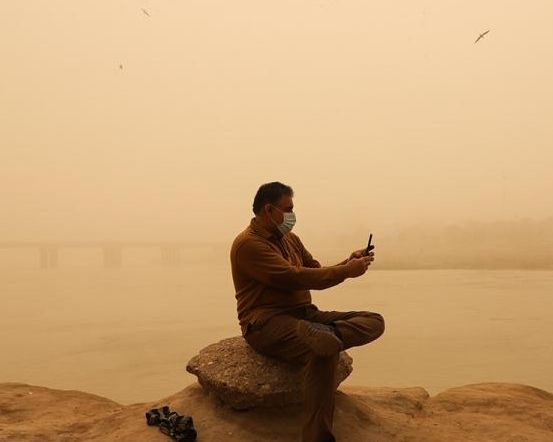
Dust has engulfed over a dozen Iranian provinces and the storm is expected to continue until early April, head of the national taskforce for mitigation of sand and dust storms said Monday.
The dust was coming from within Iran and from outside, Ali Mohammad Tahmasbi Birgani said. This was an international challenge, he said, needed action including through the United Nations Development and Environment Programs and the Asian and Pacific Centre for the Development of Disaster Information Management: “We have a large number of bilateral and multilateral agreements with neighboring countries, including Iraq, Syria and Turkey, but no operational action has been taken.”
A report from the Carnegie Endowment for International Peace in February projected temperatures in the Middle East and North African will rise “by at least 4°C by 2050 − that is, if greenhouse gases continue to increase at the current rate − and heat waves are set to be experienced ten times more frequently by the same year.”
Carnegie predicted growing migration, food insecurity and conflicts over resources: “In addition to increased water scarcity, climate change will produce increased aridity in parts of the MENA region in the next century, thus shrinking arable lands and disrupting agricultural patterns. Moreover, already dry soil is set to become drier, and desert dust will increasingly accumulate in the atmosphere and create more sandstorms, especially in Iraq, Saudi Arabia, and Syria.”
Dust storms and other pollutants have increased markedly in recent years in several Iranian provinces, including Khuzestan, Kermanshah, and Sistan-Baluchestan.
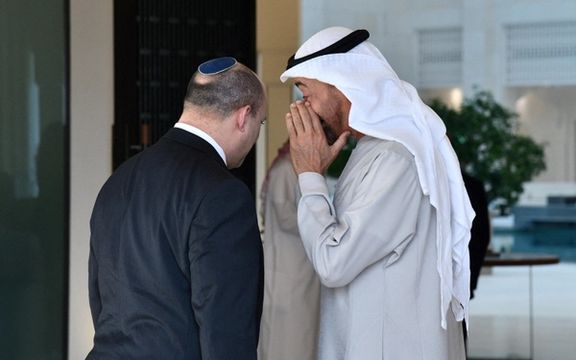
The United Arab Emirates and Israel are coordinating appeals to the US to formulate a new security strategy for the Middle East in case of a nuclear deal with Iran.
In a report Monday, Bloomberg cited “five people familiar with the matter” that the UAE and Israel believe they can use the Ukraine crisis and rising oil prices to extract concessions from Washington over intelligence and defense they were previously denied.
The UAE has bought billions of advanced weapons from the US, with one deal alone under the Trump administration put at $23.5 billion. US annual military aid to Israel is over $3.5 billion.
The two countries, which established diplomatic relations in 2020, have both received criticism in the US for equivocating over the Russia intervention in Ukraine, with Israeli premier Naftali Bennett heading to Moscow to mediate and the UAE abstaining on UN votes.
Bloomberg reported the two are coordinating in the belief that the situation is favorable to a shared approach towards the US, arguing that Iran’s foreign exchange income, and therefore its defense capacity, would be boosted if US sanctions are eased with a revived nuclear agreement.
According to the report, a senior Biden administration official said there were discussions about Iran, but did not confirm any commitment to a new plan. Iran’s Sunday missile attack at Erbil, northern Iraq, in response to an Israeli air strike a week earlier that killed two Iranian officers in Damacus, highlighted continued region tensions.
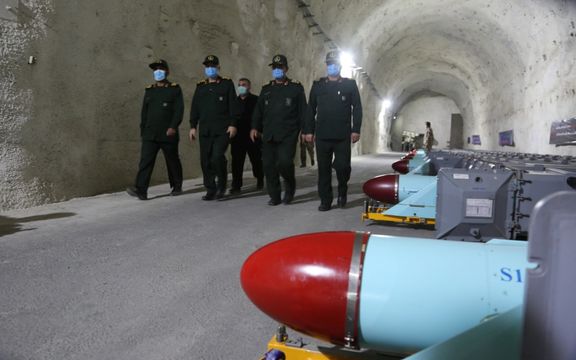
Iran's foreign ministry warned Iraqi authorities on Monday that Tehran would not tolerate the use of Iraqi soil by third parties to conduct attacks against Iran.
“The central government of Iraq has the responsibility to ensure that its territory is not used as a base for attacks by third parties against Iran,” the ministry’s spokesman Saeed Khatibzadeh told reporters at his weekly press conference in Tehran Monday. "We urge the Iraqi government to end insecurity in its borders once and for all."
“Iraqi territory was used several times in the past against Iran by third parties including terrorist groups such as Kurdish militants, the United States and the Zionist entity,” he said adding that Tehran had repeatedly warned Iraqi authorities about the use of territory by third parties to attack Iran.
The comment came a day after Iran's Revolutionary Guards (IRGC) targeted the capital of Iraq's autonomous Kurdistan, Erbil, with over a dozen ballistic missiles. In a statement hours after the attack Sunday, the IRGC took responsibility for targeting Erbil to destroy a "strategic center for conspiracy and evil of the Zionists" for Israel's "recent crimes" against Iran.
The IRGC statement did not specify Israel's "recent crimes" against Iran but on Sunday media including Iran's English language Press TV, claimed the attack was in retaliation for an Israeli airstrike on the Syrian capital of Damascus last Monday in which two IRGC officers were killed. Press TV also called Iran's retaliation a "wake up call for Iraqis about Israeli danger".
But it remains unclear why that last incident suddenly provoked Tehran while Israeli regularly bombs Iranian bases in Syria.
Another possible explanation is an alleged Israeli drone attack on a base inside Iran. Lebanon's pro-Hezbollah Al Mayadeen TV said on Monday that an Israeli base in Erbil led an attack by six drones on a Revolutionary Guard base in Kermanshah, capital of the western province of Kermanshah, in January.
Pro-Iran Kata'ib Hezbollah of Iraq in a statement Monday quoted by the IRGC-linked Tasnim news agency also claiming the operation was launched "in reaction to Israeli drone bombing of locations inside Iranian territory from inside Iraq" and said this was the start of a "new kind of conflict" in Iraq.
These could refer to loud explosions heard in western Iran, including Kermanshah, on January 15 for which Iranian authorities did not offer a clear explanation. Social media reports at the time said there was anti-aircraft activity and one explosion near or at a military base.
Several other mysterious incidents at Iran’s nuclear and military sites since July 2020 have also been attributed to Israel, including the assassination of a top Iranian nuclear official.
Iraqi officials, including Prime Minister Mustafa al-Kadhimi and influential Shiite Cleric Muqtada al-Sadr whose party won a majority in the parliament last year, have strongly condemned the Iranian attack on Erbil.
In a tweet Sunday, Al-Kadhimi said this was "an attack on the security" of Iraqi people. Iraq's foreign ministry has summoned the Iranian ambassador to protest to the attack.
Press TV quoted the secretary general of pro-Iran Harakat Hezbollah al-Nujaba as saying that the Kurdistan region authorities “provide Mossad agents with refuge” which makes it allowable for any party to target the “Zionist spies.”
US officials on Sunday appeared to suggest that Iran’s missile attack on Erbil would not impact the chances of concluding a nuclear agreement with Tehran but some US lawmakers and former officials have urged President Joe Biden to end the talks in Vienna to revive the 2015 nuclear deal between Iran and world powers, Joint Comprehensive Plan of Action (JCPOA).
IRGC’s Sunday attack came during a pause in the Vienna nuclear after a last-minute Russian demand for US guarantees it can trade freely with Iran despite Western sanctions imposed for its invasion of Ukraine. Khatibzadeh insisted on Monday that Moscow's demands had nothing to do with the delay in signing an agreement as it was the United States that had to make a decision to accept Iran's demands.

France and Germany have condemned Sunday’s Iranian ballistic missile attack on Erbil, northern Iraq, for undermining efforts to revive the Iran nuclear deal.
Paris reiterated the "absolute urgency" of concluding Vienna negotiations and said that Tehran should halt "irresponsible and dangerous behavior" that “threatened stability in Iraq and the wider region.” A statement from a German foreign office spokesperson extended condolences to residents of Erbil.
“As a close partner of Iraq and of the Kurdistan Region of Iraq, we continue to support joint efforts to strengthen Iraq’s sovereignty, its unity and stability and in the fight against Daesh (ISIS)”, Berlin’s statement read.
Germany has up to 500 troops in Iraq, concentrated in the Kurdish region, with the German parliament recently extending their mission until at least October. Iraqi Prime Minister Mustafa al-Kadhimi announced at the end of 2021 the withdrawal of foreign troops from Iraq had begun.
Iran said Sunday the missiles targeted an Israeli facility in Erbil in response to an Israeli airstrike in Damascus that killed two Iranian soldiers March 7. Sunday’s missiles fell close to a United States consulate building, damaging a villa that presumably was used by Israelis and a Kurdish TV station. One civilian was injured.
Israel’s presence in northern Iraq goes back many decades, while some Iraqi political groups are divided over normalization of relations with Israel.